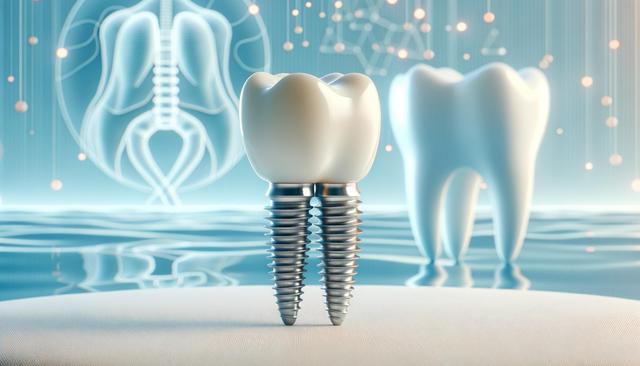Understanding the Basics of Dental Implants
Dental implants are advanced restorative solutions designed to replace missing teeth with artificial ones that closely mimic the look and function of natural teeth. A dental implant typically consists of three main parts: a titanium post that serves as the root, an abutment that connects the post to the crown, and a custom-made crown that resembles a real tooth. The titanium post is surgically placed into the jawbone, where it integrates with the bone over time, creating a durable and stable foundation for the replacement tooth. This integration process, known as osseointegration, is a key reason why dental implants are known for their long-term reliability.
Dental implants can be used to replace a single tooth, several teeth, or even a full set of teeth. Unlike dentures or bridges, implants do not rely on neighboring teeth for support and are fixed in place, offering a permanent solution with minimal maintenance. Because they are embedded in the jawbone, they also help preserve bone density and prevent the deterioration that often follows tooth loss.
Who is a Suitable Candidate for Dental Implants?
Not everyone is an immediate candidate for dental implants, but many people can become eligible with proper planning and preparation. Ideal candidates are those who:
- Have one or more missing teeth
- Have healthy gums and sufficient bone to support the implant
- Are in good overall health, with no conditions that impair healing
- Do not smoke or are willing to quit during the healing process
Even if you lack adequate bone density, options such as bone grafting can help prepare the site for a successful implant. A thorough consultation with a dental professional, including X-rays and a review of your medical history, is necessary to determine if implants are the right choice for you.
Age typically isn’t a limiting factor, although candidates should have fully developed jawbones. This means dental implants are usually not recommended for children or early teens, but they can be an excellent solution for adults of all ages.
Safety and Success Rates of Dental Implants
Dental implants are considered a safe and well-established treatment with a high success rate. Studies have shown long-term success rates of over 90%, especially when performed by experienced dental professionals and followed by proper oral hygiene and care. Key factors that influence the success of dental implants include:
- Patient’s oral hygiene habits
- Quality and quantity of jawbone at the implant site
- Experience and skill of the dental practitioner
- Lifestyle choices such as tobacco use or uncontrolled diabetes
Most patients experience minimal discomfort following the procedure, which can often be managed with over-the-counter pain medication. Although complications are rare, they can include infection, nerve damage, or implant failure, particularly if the patient does not follow post-operative care guidelines. Regular follow-up visits and dental checkups are essential for monitoring the health of the implant and surrounding tissues.
Cost Considerations of Dental Implants
One of the most common concerns surrounding dental implants is the cost. While they are generally more expensive upfront than other tooth replacement options, many patients view them as a long-term investment due to their durability and minimal maintenance. The total cost of dental implants can vary widely depending on:
- The number of implants needed
- The complexity of the procedure
- Geographic location and dental provider fees
- Additional procedures, such as bone grafting or sinus lifts
Although dental insurance may not always cover the entire implant procedure, some plans may contribute to portions of the process, such as the crown or initial consultation. Additionally, many dental offices offer payment plans or financing options to make treatment more accessible.
When considering cost, it’s helpful to compare the long-term value of implants versus other solutions. Dentures and bridges may need replacement or adjustments over time, whereas implants can last several decades with proper care, potentially making them more cost-effective in the long run.
Living with Dental Implants
Once placed and fully healed, dental implants function much like natural teeth. They allow patients to eat, speak, and smile with confidence, often without the inconveniences associated with removable dentures. One of the great advantages of implants is their ability to restore not only the function but also the aesthetic appearance of a natural tooth, providing a seamless result that blends with the patient’s existing smile.
Maintaining dental implants is straightforward and involves the same daily practices recommended for natural teeth:
- Brushing twice a day with a non-abrasive toothpaste
- Flossing daily to clean between teeth and around the implant
- Using an antibacterial mouthwash if recommended by your dentist
- Attending regular dental checkups and cleanings
With consistent care, implants can provide long-term support without the shifting or discomfort that may occur with other dental prosthetics. They also support facial structure by maintaining bone levels, which can prevent the sunken appearance often associated with tooth loss over time.
Conclusion: Is a Dental Implant Right for You?
Dental implants offer a reliable and aesthetically pleasing solution for those seeking to restore missing teeth and improve oral health. While they may involve a higher initial cost and a surgical procedure, their potential to provide a lasting, natural-looking result makes them a compelling option for many patients. If you’re considering dental implants, consult with a qualified dental professional to determine whether you’re a suitable candidate and to develop a personalized treatment plan. With the right care and attention, dental implants can be a valuable investment in both your smile and overall well-being.







